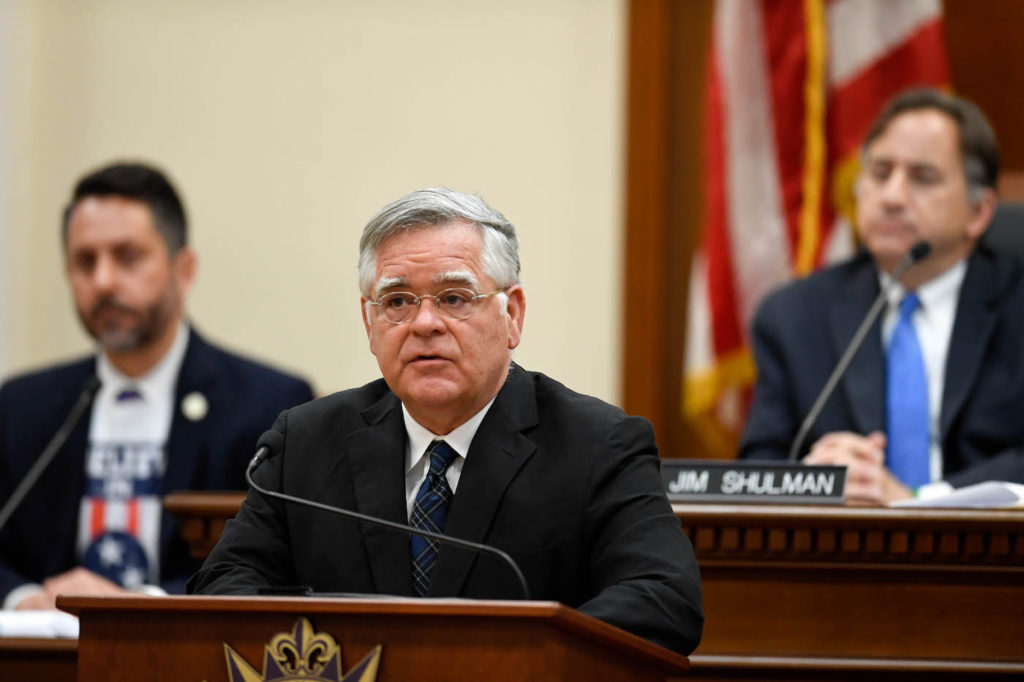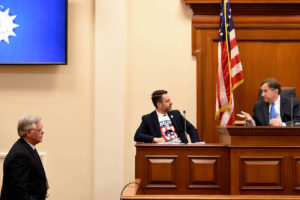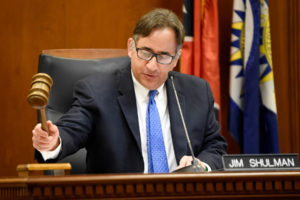
A three-pronged crisis has put Nashville in its most difficult period ever, Mayor John Cooper said Tuesday in his State of Metro speech. And as the city reels from a devastating tornado, the outbreak of COVID-19 and a sharp economic hit, the mayor said he must raise the property tax rate so that Metro can survive.
“This is no time for avoiding unpleasant realities or gambling with the city’s future,” Cooper said. “We can’t print money or borrow … we must raise property taxes, as difficult as that is right now.”
His announcement came amid what Cooper called vulnerable and uncertain times. Nashville is working to rebuild more than 2,200 tornado-damaged structures while operating under “Safer At Home” business closures and social distancing guidelines that are meant to slow the viral spread.
Cooper also cited Nashville’s ongoing difficulties — like a shortage of school teachers, textbooks, affordable housing, sidewalks and adequate transportation systems.
The logistics for the mayor’s speech added another layer of unease to the moment.
Cooper spoke from a mostly empty Metro Council chambers, in front of an intentionally sparse crowd. Only two leading councilmembers attended to take part in the remarks.
 George Walker Pool/The Tennessean
George Walker Pool/The TennesseanNashville Mayor John Cooper, Council President Pro Tempore Jeff Syracuse and Nashville Vice Mayor Jim Shulman speak before the State of Metro Address from the Council Chambers at the Metro Courthouse Tuesday, March 31, 2020 in Nashville, Tenn.
“Our community is connected even when we have to stay apart,” the mayor said.
Cooper did include moments of gratitude and optimism.
He thanked Metro employees, grocery store clerks, delivery drivers and health care providers for their “quiet heroism.” And he looked into the future to a time when tourists return and growth resumes.
“I’m optimistic enough to see that we will go back to having traffic problems in a few months,” Cooper said. “Our ability to respond to two simultaneous emergencies will confirm Nashville as a place where people want to put their future.”
Budget Challenges Add To Vulnerable Moment
The mayor campaigned on a message of fiscal stewardship, and despite the unimaginable turn of events, he rang those themes during his first State of Metro.
“Our lack of a rainy day fund has left us vulnerable in what has become a stormy season,” Cooper said. “And then came the unexpected.”
Insurance and federal funds could provide some relief, but the mayor noted those safety nets could take months or years to be realized.
In the meantime, finance officials are estimating tax revenue losses of up to $300 million in the final quarter of the fiscal year, which concludes at the end of June.
Cooper said those losses are compounded by four other factors: a historically low property tax rate, declining cash balances, rising city debt payments and Metro’s reliance in recent years on one-time asset sales to balance its budgets.
“We cannot cover such a shortfall just by cutting services,” Cooper said. “We need to find hundreds of millions of dollars in savings and in new revenues just to keep us where we were.”
The mayor did announce an additional contribution of $35 million from the Convention Center Authority.
His proposed budget will be delivered to the Metro Council by April 28.
Vice Mayor Captures The Moment
Donelson Councilmember Jeff Syracuse, who wore a shirt with the “I Believe In Nashville” logo, opened the program.
And Vice Mayor Jim Shulman offered brief remarks, and called on all residents to take responsibility for “flattening the curve” — or practicing social distancing to slow the spread of COVID-19.
 George Walker Pool/The Tennessean
George Walker Pool/The TennesseanNashville Vice Mayor Jim Shulman calls to order the State of Metro Address from the Council Chambers Tuesday, March 31.
“It doesn’t care who you are or where you are, whether you are rich or poor, black or white, young or old. It has been called the great equalizer,” Shulman said.
He said the stronger the actions that people take now, the less severe the pandemic will be in Nashville.
He also called attention to what he saw as a slim silver lining during the sunny spring weather over the weekend, when people were out walking and gardening.
“It was almost as if people were discovering more about themselves because they are forced to slow down,” Shulman said. “Take advantage of this downtime. We may not like it. But put it to good use.”

